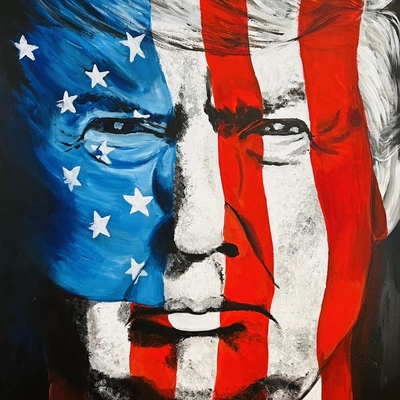Stay informed on the latest Truth Social posts from Donald Trump (@realDonaldTrump) without the doomscrolling. Consider it a public service for your mental health. (Why?)
- Tariffs have generated trillions of dollars for the country.
- Tariffs have been incredible for the country, its stock market, and general wealth.
- Tariffs have not caused inflation or any other problems for America.
- Tariffs result in massive amounts of cash pouring into the Treasury's coffers.
- Consumers are not paying these tariffs; foreign companies and governments are.
- David Solomon and Goldman Sachs refuse to give credit for the success of tariffs.
- Goldman Sachs and David Solomon made bad predictions about market repercussions and tariffs.
- Goldman Sachs and David Solomon are frequently wrong.
- David Solomon should get a new economist or focus on being a DJ instead of running a major financial institution.
The post discusses tariffs as beneficial to the stock market and wealth, reinforcing a pro-tariff stance that could be interpreted as a potential future policy direction, which might create uncertainty for multinational corporations or import-reliant sectors. It also directly criticizes Goldman Sachs and its CEO, David Solomon, which could slightly impact investor sentiment towards the firm or the broader financial sector, though unlikely to cause significant S&P 500 movement given its nature as a social media commentary rather than a policy announcement.
The post focuses on domestic economic policy (tariffs) and criticism of a financial institution and its CEO. It contains no direct threats, ultimatums, or military references that would suggest an increased likelihood of international conflict escalation.
- Commodities: The claim that tariffs yield 'trillions of dollars' and benefit the country without causing inflation, while stating foreign entities bear the cost, might imply continued or expanded use of such policies. This rhetoric could lead to perceived trade tensions, potentially increasing demand for safe-haven assets like Gold (XAU) due to fear, but the direct impact is limited as no new policy is announced. Oil (WTI) is unlikely to be directly affected. Short-Term Watchlist: XAU/USD price action if trade rhetoric intensifies. Medium-Term Focus: Inflation trends in light of tariff discussions.
- Currencies (Forex): The assertion that tariffs bring 'massive amounts of CASH pouring into our Treasury’s coffers' might be seen as generally positive for the US economy's fiscal health in the narrative presented. This could be marginally supportive of the US Dollar Index (DXY) if perceived as a robust fiscal policy, but the effect is likely minimal as it's a re-assertion of past claims. Short-Term Watchlist: Broader risk sentiment. Medium-Term Focus: Overall US economic policy direction.
- Global Equities: The post explicitly states tariffs have been 'incredible for its Stock Market,' suggesting a positive view on their impact on equities. The criticism of Goldman Sachs and David Solomon, a prominent financial institution and its leader, could slightly impact investor sentiment within the financial sector or for Goldman Sachs specifically. However, for broader indices like the S&P 500, Nasdaq, STOXX 600, Nikkei 225, or Hang Seng, the direct impact is limited as no new policy is introduced. Short-Term Watchlist: Financial sector performance, investor reactions to criticism of major institutions. Medium-Term Focus: Macro data and central bank policy.
- Fixed Income (Bonds): The claim of 'massive amounts of CASH pouring into our Treasury’s coffers' due to tariffs could be interpreted as a positive for US fiscal revenue. This might be seen as reducing pressure on government borrowing in the narrative, potentially leading to a slight decrease in concerns about bond supply. However, the impact on US 10Y and 2Y yields is likely minimal without a concrete policy shift or new economic data. There is no flight to safety implied. Short-Term Watchlist: No immediate specific watchlist items. Medium-Term Focus: Fiscal policy announcements.
- Volatility / Derivatives: The post's content is unlikely to trigger a significant spike in the VIX or immediate shifts in options positioning, as it primarily re-states past positions and criticizes individuals rather than introducing new, highly uncertain policy or events. Volatility is likely to remain stable. Short-Term Watchlist: VIX levels are unlikely to be impacted. Medium-Term Focus: Broader economic uncertainty.
- Crypto / Digital Assets: The post does not contain any direct references to cryptocurrency or digital assets. Its focus on traditional trade policy and financial institutions means there is no direct catalyst for Bitcoin (BTC) or other crypto assets to behave as a risk-on asset or macro hedge based solely on this post. Short-Term Watchlist: No direct impact. Medium-Term Focus: Broader macro liquidity backdrop and regulatory news.
- Cross-Asset Correlations and Systemic Risk: The content of the post is not indicative of potential breakdowns in normal correlations or signs of systemic stress. It is a commentary on economic policy and a specific financial institution, not a trigger for margin calls or liquidity issues. Short-Term Watchlist: No immediate systemic risk indicators. Medium-Term Focus: Broader market stability.
- Retail Sentiment / Market Psychology: The post might reinforce a particular economic narrative among retail investors who align with the stated views on tariffs. The criticism of Goldman Sachs and David Solomon could resonate with certain retail segments, but it is unlikely to trigger widespread retail speculation in meme stocks or altcoins. Short-Term Watchlist: Social media trends related to tariffs or specific financial institutions, but no expectation of market-moving retail action. Medium-Term Focus: Overall public perception of economic policy.

